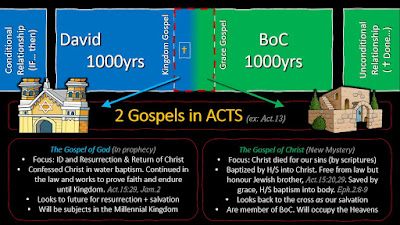Understanding the New Testament Gospel Differences (Part 5)
Understanding the New Testament Gospel Differences (Part 5 --- A Future Salvation)
We continue with the comparison of the gospel of God and the gospel of Christ
by looking at key elements that distinguish them from each other. I recommend
to
start at the beginning of this comparison
to gain the necessary context of this series of posts.
Salvation was Future
A simple fact that does not need much proof is that in the gospel of the Kingdom, and the gospel of God, the hope of salvation lay out in the future. This of course is very different to the gospel of Christ (or the Grace gospel), where salvation is not a hope out in the future based on one's works and the conditional requirement to endure to the end, but rather a factual and unconditional sealing of one's salvation by the Holy Spirit because of the cross work of Christ.
2 Corinthians 1:21-22 Now he which stablisheth us with you in Christ, and hath anointed us, is God; 22 Who hath also sealed us, and given the earnest of the Spirit in our hearts.
Ephesians 1:13-14 In whom ye also trusted, after that ye heard the word of truth, the gospel of your salvation: in whom also after that ye believed, ye were sealed with that holy Spirit of promise, 14 Which is the earnest of our inheritance until the redemption of the purchased possession, unto the praise of his glory.
2 Corinthians 5:5 Now he that hath wrought us for the selfsame thing is God, who also hath given unto us the earnest of the Spirit.
Ephesians 4:30 And grieve not the holy Spirit of God, whereby ye are sealed unto the day of redemption.
Where our salvation today is instant and immediate, saved positionally in the spirit, the other gospels promise a hope of resurrection in the future and which is conditionally dependent on faithfulness to the law, to works and to endurance to the end.
Acts 3:18 But those things, which God before had shewed by the mouth of all his prophets, that Christ should suffer, he hath so fulfilled. 19 Repent ye therefore, and be converted, that your sins may be blotted out, when the times of refreshing shall come from the presence of the Lord. 20 And he shall send Jesus Christ, which before was preached unto you: 21 Whom the heaven must receive until the times of restitution of all things, which God hath spoken by the mouth of all his holy prophets since the world began.
Notice the conditional forgiveness when it eludes to the Lord forgiving them in the day of refreshing.
Matthew 24:9 Then shall they deliver you up to be afflicted, and shall kill you: and ye shall be hated of all nations for my name's sake. 10 And then shall many be offended, and shall betray one another, and shall hate one another. 11 And many false prophets shall rise, and shall deceive many. 12 And because iniquity shall abound, the love of many shall wax cold. 13 But he that shall endure unto the end, the same shall be saved.
Endurance to the end, remaining faithful in works and commitment to faith, and not submitting to the the temptations and demands of the Antichrist will ensure salvation for those who wait for Christ's coming in that day.
1 John 1:6 If we say that we have fellowship with him, and walk in darkness, we lie, and do not the truth: 7 But if we walk in the light, as he is in the light, we have fellowship one with another, and the blood of Jesus Christ his Son cleanseth us from all sin. 8 If we say that we have no sin, we deceive ourselves, and the truth is not in us. 9 If we confess our sins, he is faithful and just to forgive us our sins, and to cleanse us from all unrighteousness.
Notice the conditional statements of forgiveness and the hope they had to have for salvation in the future when Christ comes again to resurrect and judge his people.
As we can clearly see, the concept of salvation between the transition period of Acts changed. The earlier gospels looked forwards to a hope of salvation based on works and endurance. The gospel of Christ (our Grace gospel today) looks back at the cross of Christ and draws it's hope (which is a guaranteed and assured expectation) from the work of Christ and enjoys an immediate redemption of the spirit through justification.



Comments
Post a Comment